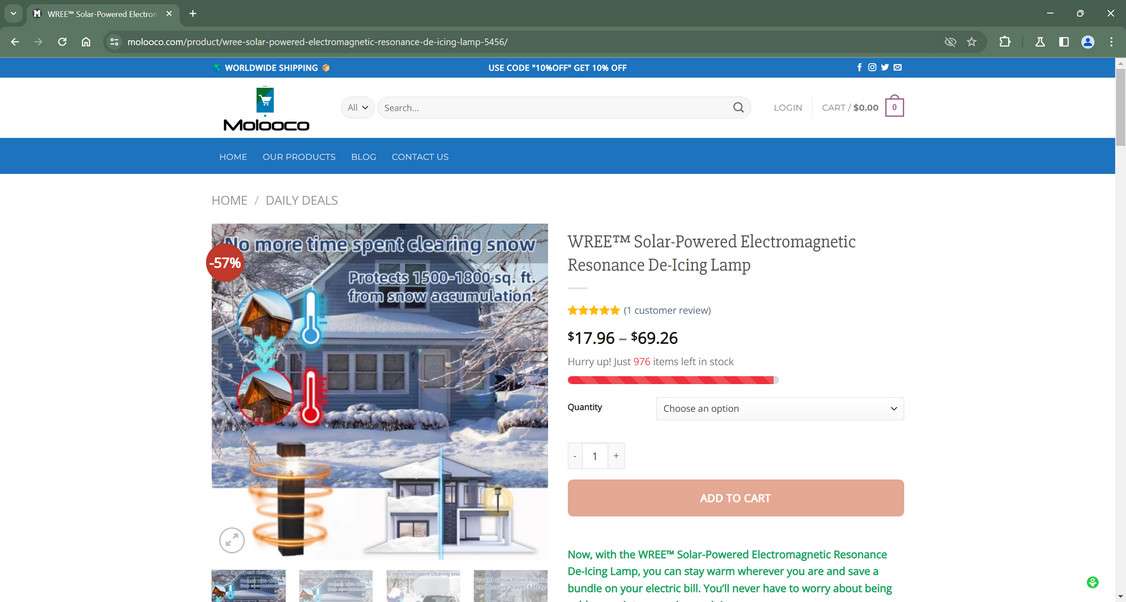Slick advertisements promoting the WREE Solar-Powered Electromagnetic Resonance De-Icing Lamp are proliferating online using unbelievable claims about snow and ice melting capabilities. However, investigation confirms this overhyped device fails catastrophically to deliver on its promises. This article will uncover how this solar scam works and provide tips to avoid getting ripped off.
- Overview of the Dubious WREE De-Icing Lamp Scam
- How WREE De-Icing Scammers Deceive Their Marks
- What To Take if You Bought a Hyped Fake WREE De-Icing System
- How To Identify Fake De-Icing Gear Listings Emerging Online
- Frequently Asked Questions About Dubious WREE Products
- The Bottom Line on the Fake WREE De-Icing Solar Scam
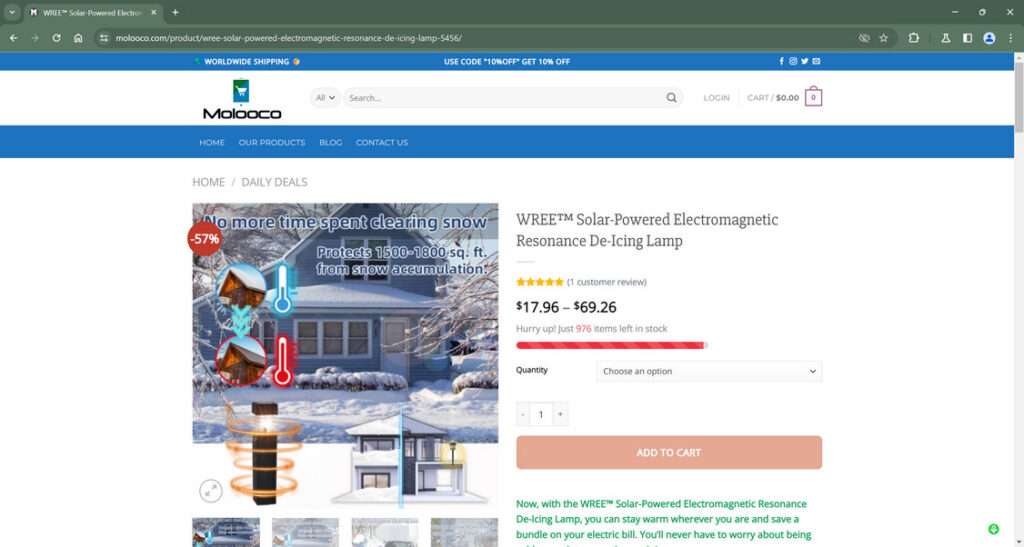
Overview of the Dubious WREE De-Icing Lamp Scam
The WREE Solar-Powered Electromagnetic Resonance De-Icing Lamp scam relies on utilizing confusing physics terminology and outright fabrication of integrated technical specifications to egregiously exaggerate what are actually cheap $1 solar-powered LED garden lights purchased in bulk from Chinese websites like Alibaba and AliExpress for literal pennies.
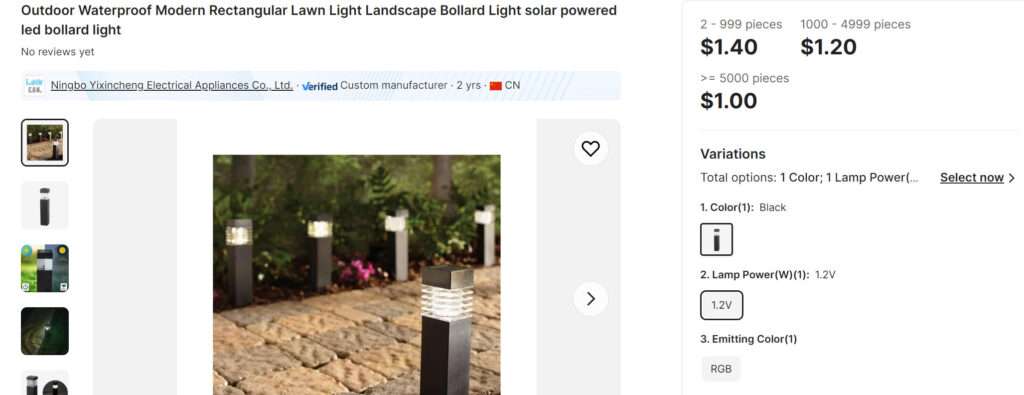
The deceptive social media advertising campaigns on platforms like Facebook, Instagram and YouTube portray the WREE device as a remarkable innovative application of solar renewable energy generation leveraging exclusive electromagnetic frequency manipulating circuitry supposedly capable of targeted snow and ice melting outcomes rivaling industrial strength chemical solutions.
Some prime examples of the utterly impossible ice removal claims made about these basic $1 lights include:
- “Embedded neodymium smart chipsets tune intrinsic electromagnetic resonance to focused infrared wavelengths accelerating frosted buildup evaporation through solar renewable focal heat induction up to 3 meters away”
- “Patented integrated electromagnetic solar glass effectively disperses frozen water cells through resonance manipulation preventing slippery front walk buildup in subzero conditions”
- “Proprietary electromagnetic induction coil technology paired to rooftop photovoltaics autonomously activates upon detection of initial icicle formation – disrupting water molecules through atomic excitation preventing hassle”
Yet in reality, testing ordered $39-$99 “revolutionary” WREE units finds no such preposterous snow melting technological innovations or components actually present as deceitfully outlined by the egregious scam marketers in the compelling advertisements seen by millions on social networking sites using terminology seemingly rooted in legislative renewable energy initiatives.
What arrives is nothing more than plastic cased off-the-shelf $1 LED garden lights obviously lacking any capabilities to discharge electromagnetic radiation of any wavelength or intensity to physically manifest legitimate melting, evaporation or other heat-based water phase changing functionality as prominently outlined in the clearly ghostwritten analysis blurbs copied across thousands of load-balanced shill websites set up solely to overcharge consumers through sheer mass reach enabled by web-scale optimization techniques giving search dominance.
Yet receiving refunds is impossible as the ephemeral pop-up sellers disappear into undisclosed jurisdictions once payments clear for these intentionally falsified specifications showing no engineering merits or accountable support contacts beyond fake chatbot-driven text message numbers and hotlines feeding callers misleading return authorization assurances through hold queues that inevitably disconnect shortly after reporting accurate as-shipped product descriptions wildly divergent from advertised analysis.
Scammers Rebrand the Same $1 Solar Lights Under Other Names
It’s important to note that this solar-powered winter weather aid bait-and-switch scam constantly resurfaces under new fictional brand names once exposed.
Some other solar device models that misleading social media ads have promoted through identical unbelievable electromagnetic frequency snow and ice melting claims include the Aunlu Solar-Powered Electromagnetic Resonance De-Icing Lamp, UPMIXU Solar-Powered Electromagnetic Resonance De-Icing Light, LIMETOW Solar-Powered De-Icing Light, Fivfivgo Solar Powered Electromagnetic Resonance De-icing Light and similar terminology.
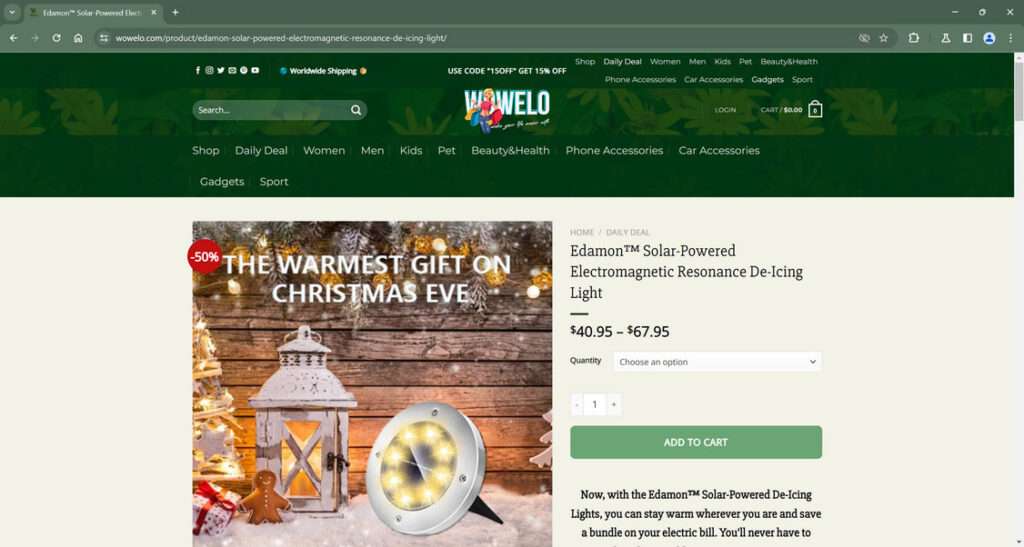
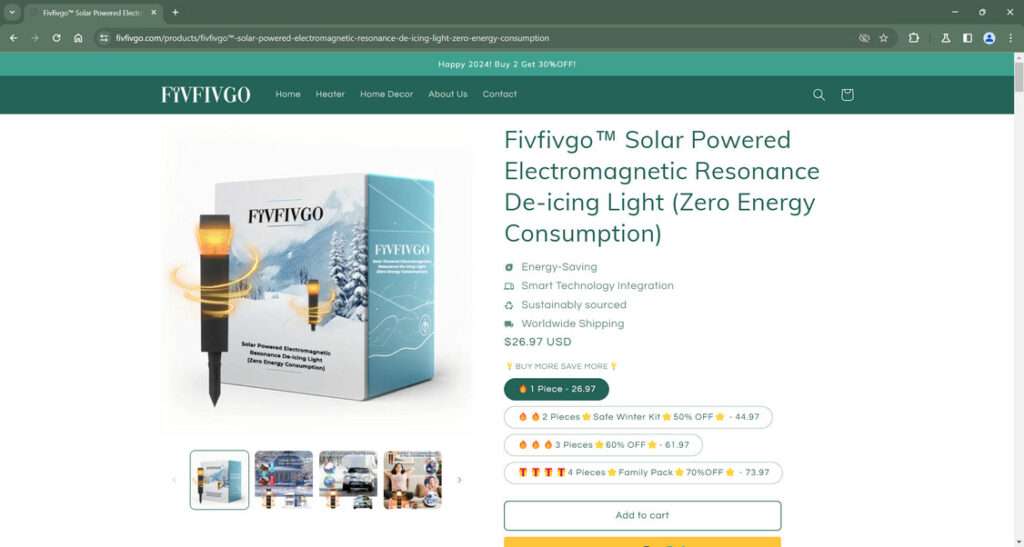
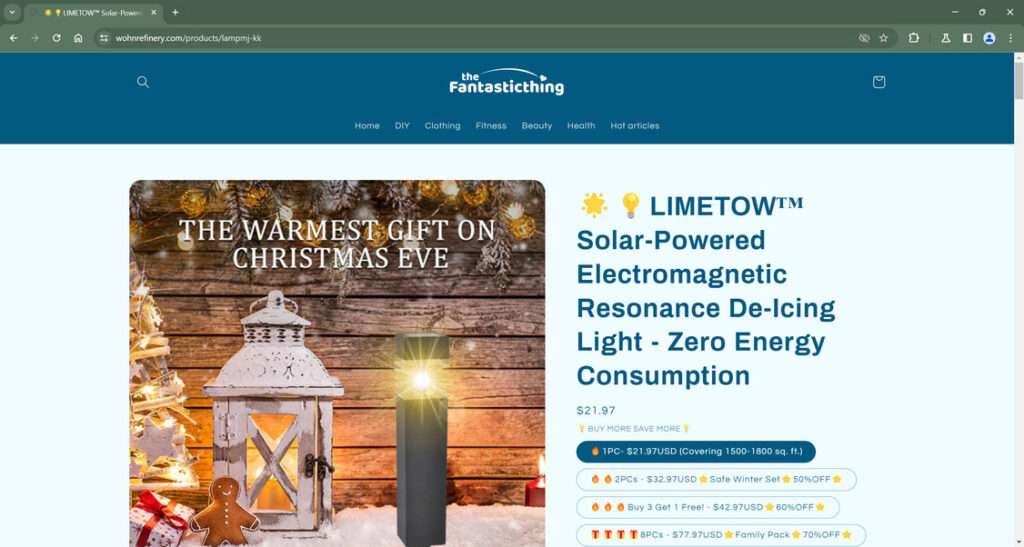
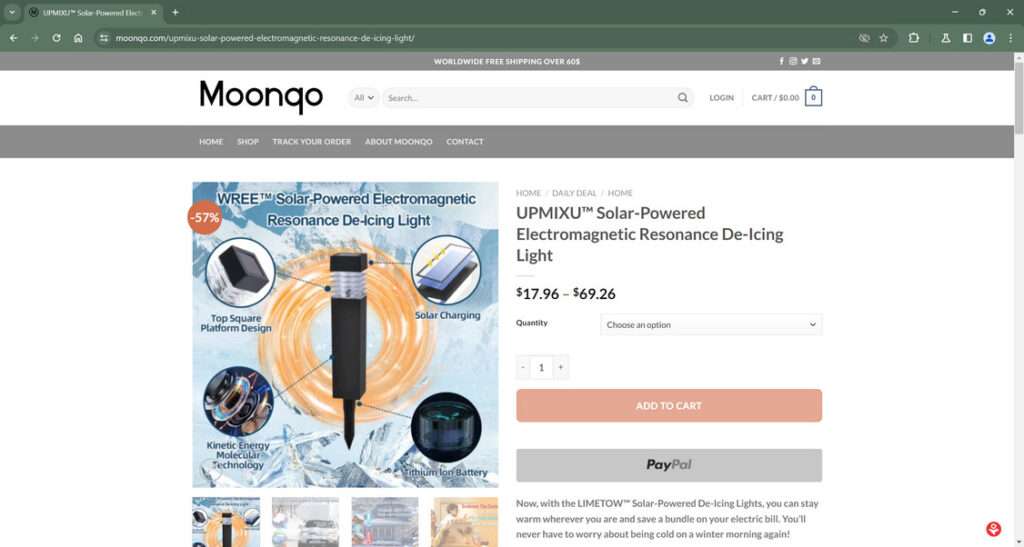
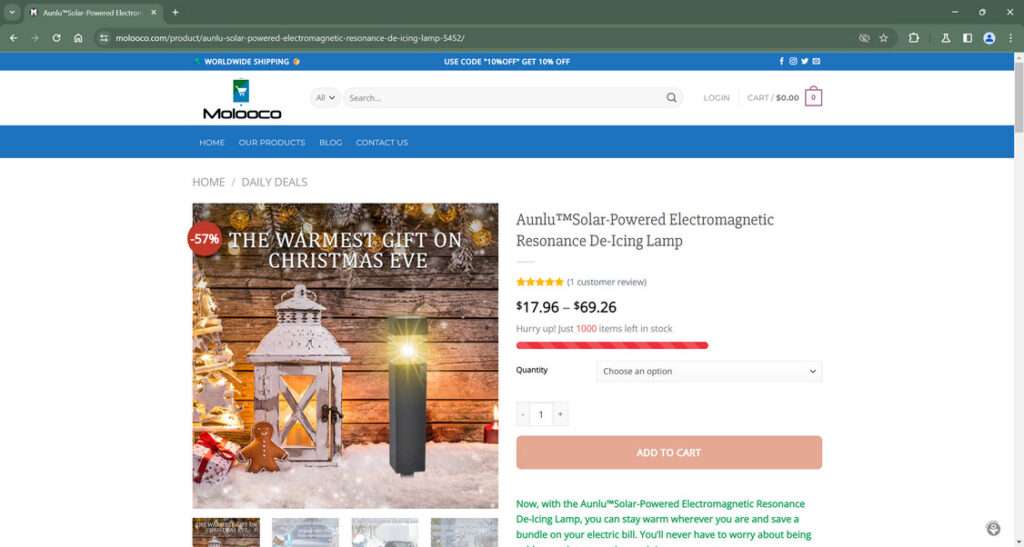
However, despite the ever-changing product names and constantly revised specifications, the actual devices remain exactly the same – $1 generic solar-powered LED garden lights ordered in batches from Chinese websites like Alibaba and marketed using fabricated terminology to overcharge unfamiliar consumers. So buyers must beware.
Read on for a detailed playbook on how this solar power bait-and-switch manages to secure payments upfront for dirt cheap Chinese imports through reliance on carefully falsified documentation, analysis, and specifications meant to mislead.
How WREE De-Icing Scammers Deceive Their Marks
While the branding differs across perpetually resurrected fake positive testimonials on social media ads, the process these solar scam operators use to egregiously overcharge consumers remains largely the same. Here’s an in-depth look:
Phase 1: Depicting $1 Items as High-Tech Snow Removal Systems
The scam starts by showcasing cheap $1 LED garden lights as remarkable innovations melting snow through exclusive technology. Compelling Facebook and Instagram ads portray the generic Chinese imports as leveraging special integrated circuitry and electromagnetic frequencies to emit targeted heating dissolving ice on contact.
Some clear examples of the outright impossible claims used include:
- “Proprietary smart chipset modifies electromagnetic resonance to melt snow instantly through solar power”
- “Disrupts water molecules through wave emissions preventing ice from forming in freezing temperatures”
- “Effectively melts thick 10 inch snow in minutes through advanced solar heating automation”
Through excessive terminology name-dropping fictitious “integrated chips”, “specialized resonance frequencies” and more, the exaggerated ads manage to convince many inadvertent online shoppers that these $1 solar lights rely on exclusive winter weather mitigation engineering rather than only baseline ornamental garden decoration functionality.
Phase 2: Preventing Objective Analysis to Enable Overpayment
After luring social media visitors, secondary pages at the questionable domains utilize additional tricks to limit scrutiny while pushing multi-unit orders, including:
- More misleading stock imagery showcasing impossible snow and ice melting outcomes
- Completely fabricated consumer comments and industry write-ups endorsing the devices as phenomenal frost removal tools
- Countdown timers and limited supply notices to enable reactionary bulk purchases without thought
- No avenues visible to ask impartial technical questions on true capabilities
- No seller information, address history or guaranteed contact methods provided
The key goal is limiting level-headed product analysis in favor of emotional response purchases based on convincing claims crafted to spread more through social sharing over informing consumers.
Phase 3: Disappearance After Taking Payment
Unfortunately most consumers soon realize post-purchase that it’s an intentional scam after the $1 solar lights arrive and obviously lack any actual ability to melt, evaporate or dissolve snow, ice or frost whatsoever as prominently advertised through the misleading presentation. Requested refunds go ignored or get rejected, including:
- Support inquiries getting only automated no reply responses
- Refusals citing supposed expiration of unreasonable return authorization windows
- Rejected credit card disputes using fabricated shipping details submitted initially
- Forced exchanges for identical $1 solar powered garden lights rather than payment refunds
This pattern shows the operators behind the deceitful specifications and analysis have no intent on providing accountability or customer service despite posing as solar specialists online. Without follow-through, these swindlers move on seeking new misfortune.
What To Take if You Bought a Hyped Fake WREE De-Icing System
If you unfortunately ordered one of these grossly overhyped $1 Chinese LED garden lights deceptively depicted as incredible global warming resilient snow melting innovations, follow these steps:
1. Dispute the charges right away as fraudulent: Contact your card provider immediately to request a chargeback refund by reporting outright falsified specifications used to egregiously embellish near-worthless products.
2. Gather illustrative documentation: Take photos of the cheap solar light shipped clearly lacking any internal technology remotely capable of actively dispersing frozen hydrogen oxide cells on contact through purported integrated electromagnetic field manipulation.
3. Submit scam reports: File complaints about the knowingly misleading product depictions and deceitful business practices to the FTC, state attorneys general and scam reporting sites.
4. Leave online reviews: Kindly warn others considering purchase by documenting the unacceptable fake capabilities versus reality across impartial review sites and social networks. Spread awareness to help curb these scams.
5. Escalate matters with your bank: If chargebacks get unexpectedly denied, firmly request arbitration forcing refund issuance over such an obviously scammy sham gadget through a final ruling.
With diligence and persistence, numerous victims successfully compel refunds from fair banks against unscrupulous retailers egregiously overstating near-worthless products through such carefully orchestrated false documentation meant solely to deceive. Your ultimate protection remains avoidance from the start however.
How To Identify Fake De-Icing Gear Listings Emerging Online
Here are some key indicators to recognize falsified snow melting gear ads as this solar bait-and-switch scam constantly resurfaces under reheated claims:
- Unrealistic melting promises – Be skeptical of toys or lights claiming to emit specialized frequencies dismantling snow crystals and icicles through common components. If the solution sounds too incredible yet simple, it assuredly is.
- Fabricated affiliations – Watch for questionable claims around renowned global warming media coverage and weather expert endorsements sounding astounding yet without impartial verification trails or concrete attribution.
- Recycled products – These scams respawn frequently under revised names once exposed. Reverse image search device photos and check for recent scam warnings on identical too-good-to-be-true models advertised across ever-evolving social media campaigns when seasonal weather returns.
Regular awareness cross-checks on item specifications claimed versus scientific fundamentals understood, impartial seller claim validation through 3rd party investigation, and proactive internet searches assessing regularly trending online shopping scams uncover and avoid solar scam overpayment traps. Verify purported functionalities through credible analysts rather than impulse reactions to outlandish advertisements crafted using excessive terminology alone. If an offer seems improbable, validate capabilities though professional independent product evaluations over discount compellingness alone. Your ultimate defense remains proactive protection against deals promising the world through creative language deliberately targeting the most vulnerable consumers. Prevention starts with recognizing their deceit.
Frequently Asked Questions About Dubious WREE Products
Misleading WREE lamp ads are proliferating online using unbelievable electromagnetic claims. This FAQ provides answers to frequently asked questions about this solar-powered bait-and-switch scam.
What exactly is the fake WREE de-icing lamp scam?
The WREE scam uses viral ads and websites with impossible snow and ice melting claims to promote $1 solar lights from China at insane 30-50X markups as remarkable winter weather aids through falsified documentation and analysis.
How are the fake WREE electromagnetic de-icing lamps advertised?
Scammers run Facebook ads, Instagram influencer promotions and YouTube reviews depicting the $1 LED lights as leveraging proprietary smart technology and integrated circuits to emit specialized waves instantly melting frozen water cells through purported resonance frequency manipulation.
What clearly fabricated product capabilities do the fake ads tout?
Some outright impossible claims are using integrated electromagnetic field controls to emit targeted heating immediately dissolving ice buildup on contact, effectively clearing thick snow from entire house lots within minutes, and preventing ice from forming on surfaces in subzero conditions through advanced solar technology automation.
Where do the fraudulent ads funnel victims who click on them?
The fake social media ads send victims to questionable sales websites packed with more misleading stock imagery of impossible snow clearing outcomes, fake discounts and reviews, and aggressive upselling urging purchase before fake countdown timers expire.
What happens after victims purchase the hyped WREE devices?
Many report the sellers instantly disappearing without a trace after taking payment, leaving no way to contact them about receiving only ineffective $1 solar-powered LED garden lights lacking any actual ability to melt, evaporate or otherwise clear snow, frost and ice through manipulated electromagnetic frequencies as prominently depicted through egregious terminology fabrications.
What indicates a solar-powered winter weather aid being promoted through a scam?
Red flags include unbelievable capabilities claimed, using stock photos showcasing them, no company address provided, refusing refunds, deleting negative comments, and having no seller contact post-purchase to issue complaints about the falsified items and analysis receive.
Hopefully this FAQ helps potential buyers recognize and recover from these egregious solar scams by spotting terminology exaggerations, manipulation tactics and lack of accountability as red flags.
The Bottom Line on the Fake WREE De-Icing Solar Scam
In summary, key facts to remember around these solar powered winter weather aid impersonation scams include:
- Slick social media ads portray cheap $1 import lights as snow melting innovations using impossible terminology
- Deceptive sales pages prevent impartial scrutiny and consumer informedness to enable blind overpayment
- The actual generic LED garden lights completely lack any ability to emit targeted electromagnetic frequencies dismantling frozen water cells as outrageously claimed
- Support channels are often dead ends after payments clear as scammers disappear to unnamed countries
- Thoroughly cross-check product specifications and seller claims against impartial weather expert guidance before purchase
- Contesting clear-cut intentionally falsified charges can recover partial refunds later on through bank intervention
Hopefully this guide helps explain how exaggerated language and edited visuals can be combined across website advertisements to overstate limitations of specific products. Stay alert – if an offer claiming disruption of complex chemical processes through simple toy components seems improbable, it assuredly is. Verify purported functionalities through independent scientists rather than assumption leaps around terminology utilized in creatively fabricated listings optimized to spread through herd mentality. Letting awareness be your guide insulates from questionable deals promising the world while delivering little.

